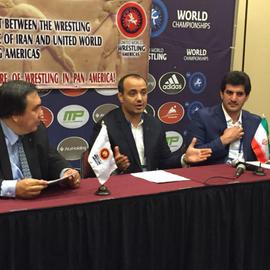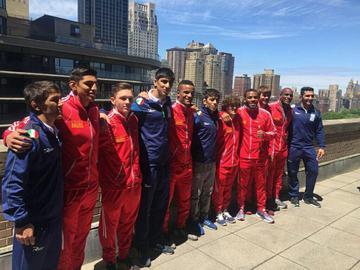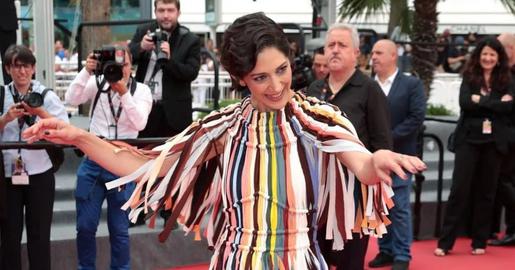If ever there was a magic pill for building better international relationships, it is sports diplomacy, says sports ambassador Hooman Tavakolian.
Imagine this: A friendly post-war baseball game as part of a rebuilding effort between two formerly warring nations. Or a volleyball game to improve opportunities for women and girls through sport. Or how about a wrestling tournament where audience members of a host Islamic nation – painted as enemies of the United States by leaders from both sides – treat the American athletes like beloved rock stars?
Stop imagining. It did happen, is happening, and continues to happen – all in the name of a global practice called sports diplomacy.
If ever there was a magic pill for building better international relationships, it is sports diplomacy. Simply put, sports diplomacy uses the universal passion of sports to achieve what a parade of politicians and reams of official documents often can't: Breaking through walls of socio-cultural and religious differences to bring people together.
Sports diplomacy is so important that President Nelson Mandela acknowledged its effectiveness during his speech at a World Sports Academy Hall of Fame ceremony a few years back: “Sport has the power to change the world . . . it has the power to unite people in a way that little else does. . . Sport can create hope, where once there was only despair. It is more powerful than governments in breaking down racial barriers. It laughs in the face of all types of discrimination.”
The practice of sports diplomacy isn't something stumbled upon in recent years. It is a real program – with a rich history – overseen by the Sports Diplomacy Division of the US Department of State's Bureau of Educational and Cultural Affairs department. As a sports diplomat, I manage the program through my New York-based company, TavakPartners.
Traditionally, the US has always used athletics as a tool to bridge gaps with adversaries.
Although baseball was introduced to the Japanese in 1896, it wasn't until 1946, the end of World War II, that we witnessed the first real example of how sports, politics, and diplomacy could interact. Nine months after Japan's surrender to the US, a baseball game between the two former enemies was played. It was through baseball that a lasting trans-Pacific friendship was forged, negative perceptions of foreigners in Japan decreased, and the morale of a nation was restored. In fact, the people-to-people link between the two countries was so successful that Major League Baseball has sent an All-Star team to Japan every other year since.
The most famous bridge of all, however, was what is referred to as the “Ping Pong Diplomacy.”
Following its entry into the Korean War in 1950, the US viewed the People's Republic of China (PRC) as an aggressor nation and enforced an economic containment policy and embargo on China.
For the next 20 years there were no diplomatic or economic relations between the two countries, until April 1971 – when the US table tennis team arrived in China for a 10-day visit. That team became the first group of Americans in over a decade to get a peek behind the “Bamboo Curtain.”
Their trip led to a renewed dialogue between the two nations, and resulted in President Richard Nixon easing travel restrictions and lifting trade embargoes against China. A year later he visited the country and the two countries have been trade partners ever since.
For nearly a decade, Tavak Partners' management has continued this strategic thinking, serving as a shuttle for diplomacy, economic development and social exchange. Armed with a solid background in international management, my work as a cultural liaison has supported America's various diplomatic efforts for nearly a decade.
More recent events prompted Tavak Partners to take the initiative and preserve America's people-to-people link with Iran.
At the beginning of 2017, both US relations and sports diplomacy initiatives were sorely tested when President Trump passed a controversial executive order. The order banned foreign nationals from seven predominantly Muslim nations, including Iran, from entering the US for 90 days. In retaliation, the Iranian government announced that no Americans would be allowed to enter Iran. Unfortunately, that included the US National Wrestling team preparing to travel there for an important international tournament.
At stake was more than participation in a wrestling match. Goodwill built up over the past decade was on the verge of crumbling if neither government could resolve this stand-off.
Being part of the National Wrestling Hall of Fame, I felt I could help and immediately took action. Working closely with Iran’s Wrestling Federation, I was able to persuade the Iranian Ministry of Sport to reverse its decision.
But even after the reversal, some of the American athletes worried that previous goodwill efforts would be compromised, and they might be entering a hostile environment.
Happily, my intervention was successful and the power of sports diplomacy prevailed once again.
The US wrestlers got the royal treatment. The place was chanting “USA, USA” the whole time. It was unbelievable. I was there in the stadium and everyone was holding signs saying “We're not terrorists” or “We support humanity.” I told the team: Your job is to go back and tell five people, and spread the news.
Like the Sports Diplomacy Division, Tavak Partners aims to deepen connections with various countries by bridging economic, social and political divisions through sport exchange and competition. But its involvement won't end there: The company will continue providing guidance to professional organizations and international federations throughout the most challenging of geopolitical divisions.
I realize that developing relationships with a sporting event or two is hardly sufficient to build global peace or even sustainable goodwill. Relationships at this level need to be continually nurtured for the work we do to be effective and history to be rewritten.
But Tavak Partners' world of sports diplomacy is this: Strategic thinking. Long-term actions. A network of global contacts and a lifetime's worth of experience.
visit the accountability section
In this section of Iran Wire, you can contact the officials and launch your campaign for various problems























comments